Are you looking to elevate your healthcare organization's strategic planning? In this article, we'll explore essential components that can drive effective collaboration and innovative solutions during your next meeting. Whether you're focusing on improving patient care or optimizing resources, having the right framework in place is crucial. So, grab a cup of coffee and dive in to discover valuable insights that will transform your approach to strategic planning!

Meeting Goals and Objectives
The healthcare strategic planning meeting aims to enhance operational efficiency within the organization, such as hospitals, clinics, and other medical facilities. Key objectives include assessing current healthcare delivery models, analyzing patient outcomes, and identifying areas for cost reduction. Participants will review performance metrics from the previous year, evaluate community health needs based on recent surveys, and set measurable goals for patient satisfaction, staff engagement, and technology integration such as electronic health records (EHR). Additionally, the meeting will prioritize long-term initiatives, including potential partnerships with local health agencies and expansion plans for telemedicine services. Overall, the goal is to create a cohesive strategy that addresses immediate challenges while also positioning the organization for sustainable growth in the evolving healthcare landscape.
Agenda and Key Topics
The healthcare strategic planning meeting agenda outlines key topics essential for organizational growth and patient care improvement. Primary focus areas include evaluating current service delivery models, assessing patient satisfaction metrics, and exploring technological advancements in telehealth services. Financial projections for the upcoming fiscal year (2024) will also be scrutinized, alongside budgeting allocations for facility upgrades and staff training programs. Market analysis data regarding competitor performance in the region, specifically compared to healthcare institutions like the Mayo Clinic and Cleveland Clinic, will inform strategic decision-making. Stakeholder feedback mechanisms, including community health surveys, will be discussed to ensure alignment with patients' needs and expectations.
Stakeholder Involvement
Stakeholder involvement in healthcare strategic planning meetings emphasizes the importance of collaboration among diverse groups. Engaging primary care providers, specialists, nurses, and administrative staff ensures that various perspectives are considered in decision-making processes. Successful meetings often occur in venues like community health centers or medical facilities, where stakeholders can directly observe and discuss prevalent health issues. Utilizing data from recent patient satisfaction surveys or health outcome metrics can guide discussions effectively. Facilitating workshops and focus groups allows stakeholders to contribute thoughts on strategic priorities and resource allocation. Ultimately, fostering an inclusive environment maximizes the potential for innovative solutions and enhances overall healthcare delivery and patient outcomes.
Data and Insights Utilization
Utilizing data and insights in healthcare strategic planning involves a comprehensive analysis of patient demographics, treatment outcomes, and operational efficiencies. These metrics, stemming from Electronic Health Records (EHR) and patient management systems, can provide valuable information for identifying health trends (such as increases in chronic disease prevalence), optimizing resource allocation (like staffing needs based on patient volume), and enhancing care delivery models. Moreover, insights derived from patient satisfaction surveys can drive improvements in service quality. Strategic meetings should emphasize integrating predictive analytics to forecast future healthcare needs, ensuring organizations remain adaptive in a rapidly changing environment. Implementing such data-driven approaches can ultimately lead to improved patient outcomes and sustainable organizational growth.
Timeline and Deliverables
The healthcare strategic planning meeting will focus on developing a comprehensive timeline and key deliverables for the upcoming fiscal year. The timeline will outline crucial milestones, starting with the initial assessment phase in January 2024, followed by stakeholder engagement sessions in February and March 2024. Deliverables will include a SWOT analysis report, highlighting strengths, weaknesses, opportunities, and threats, due by the end of April 2024. By June 2024, a draft strategic plan will be presented, incorporating financial projections and resource allocation strategies aimed at improving patient care and operational efficiency within the healthcare facility. Final approval of the strategic plan is anticipated by August 2024, ensuring alignment with regulatory requirements and organizational goals. Regular progress updates will be scheduled monthly to maintain accountability and address any emerging challenges.
Letter Template For Healthcare Strategic Planning Meeting Samples
Letter template of summary notes from healthcare strategic planning meeting
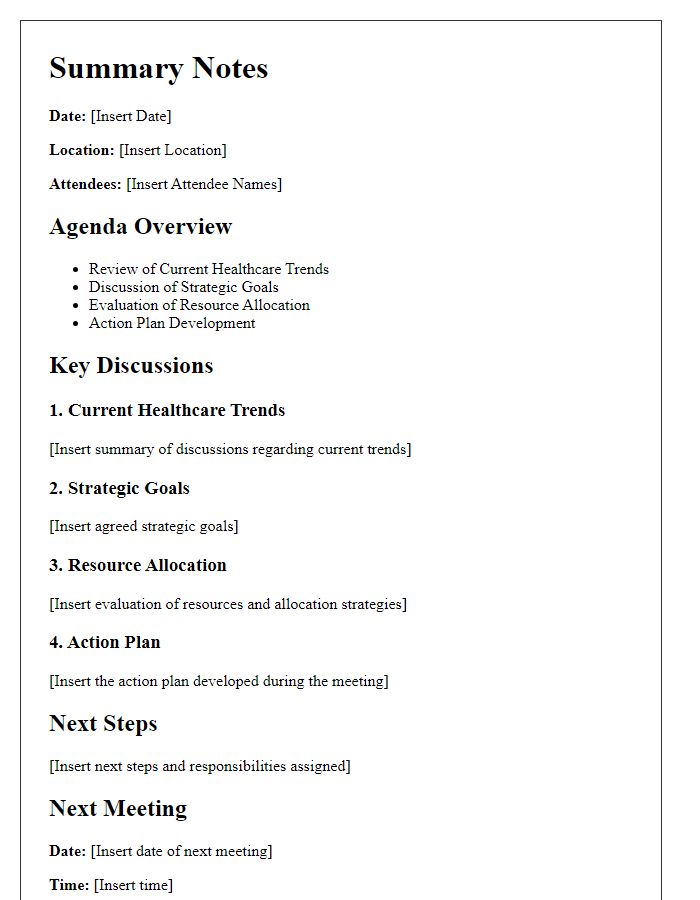
Letter template of attendance confirmation for healthcare strategic planning meeting
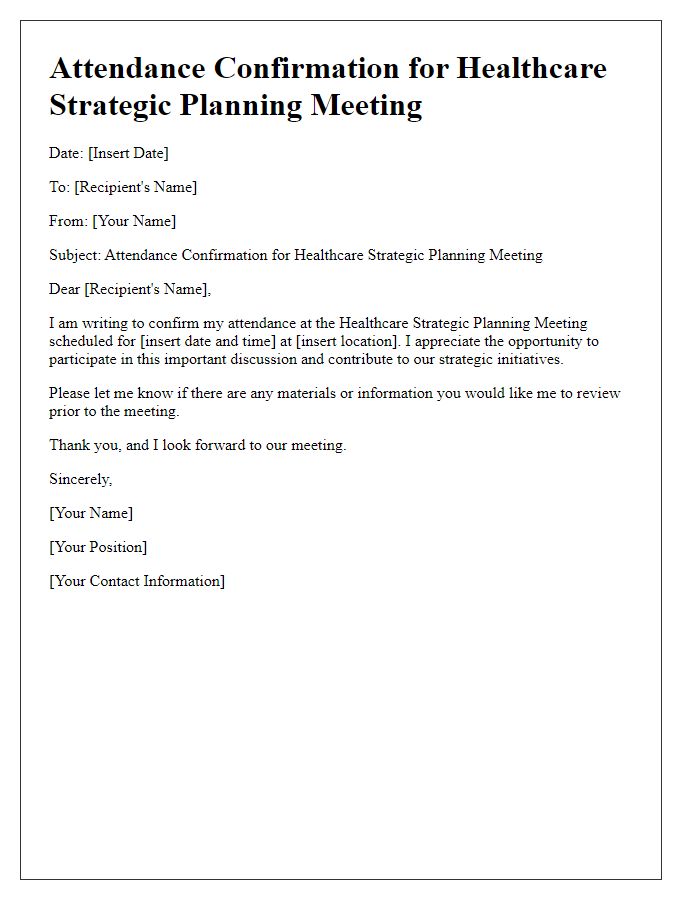
Letter template of action items from healthcare strategic planning meeting
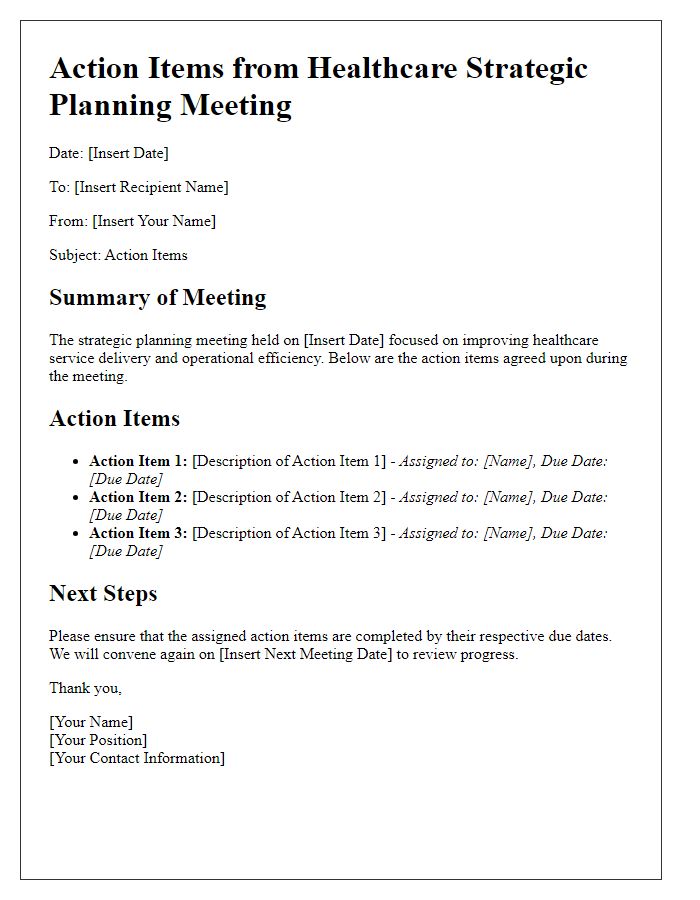
Letter template of feedback request after healthcare strategic planning meeting
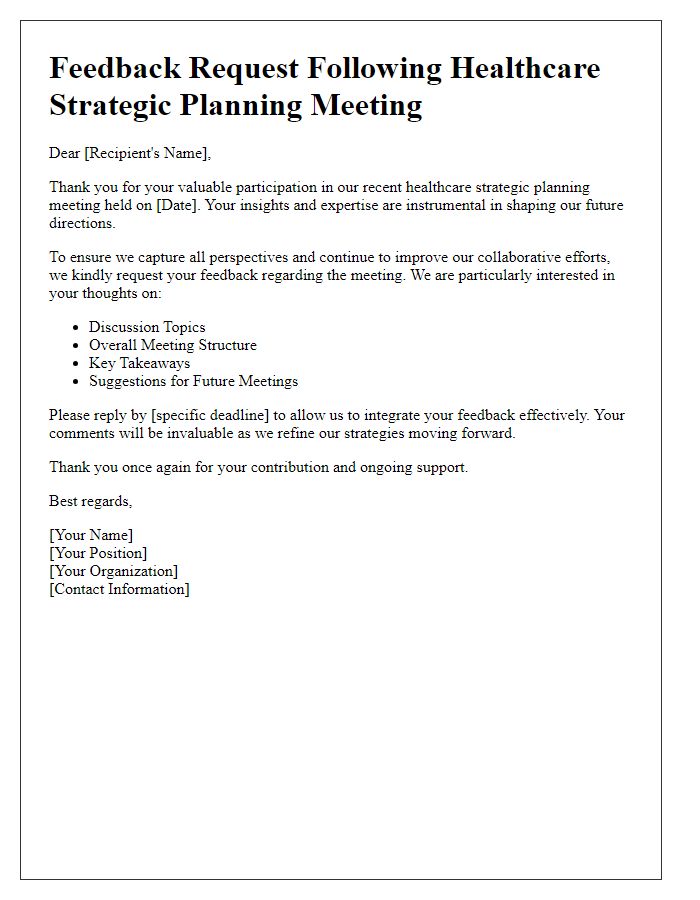
Letter template of changes to healthcare strategic planning meeting schedule
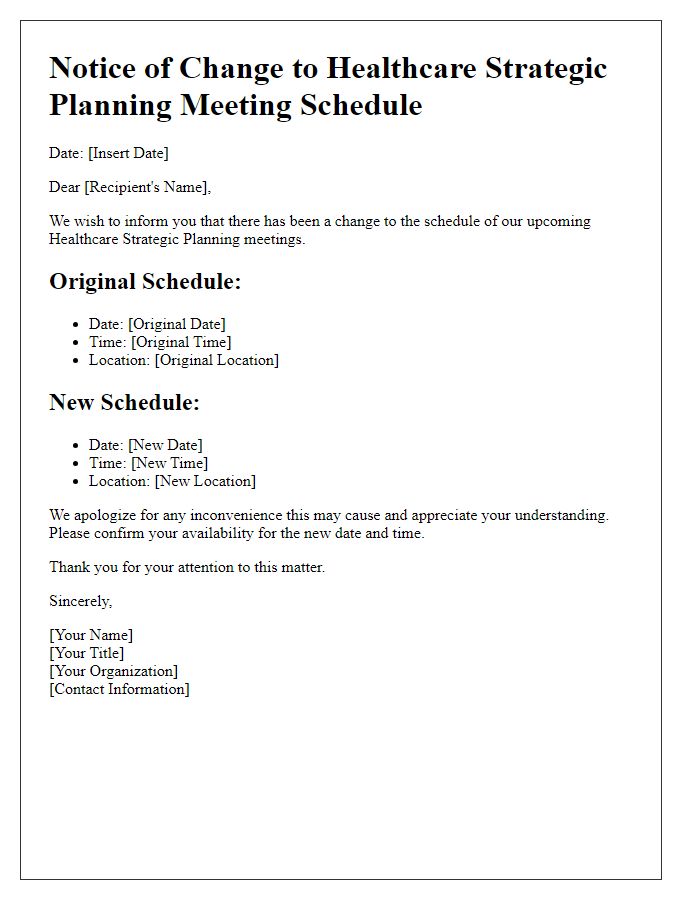


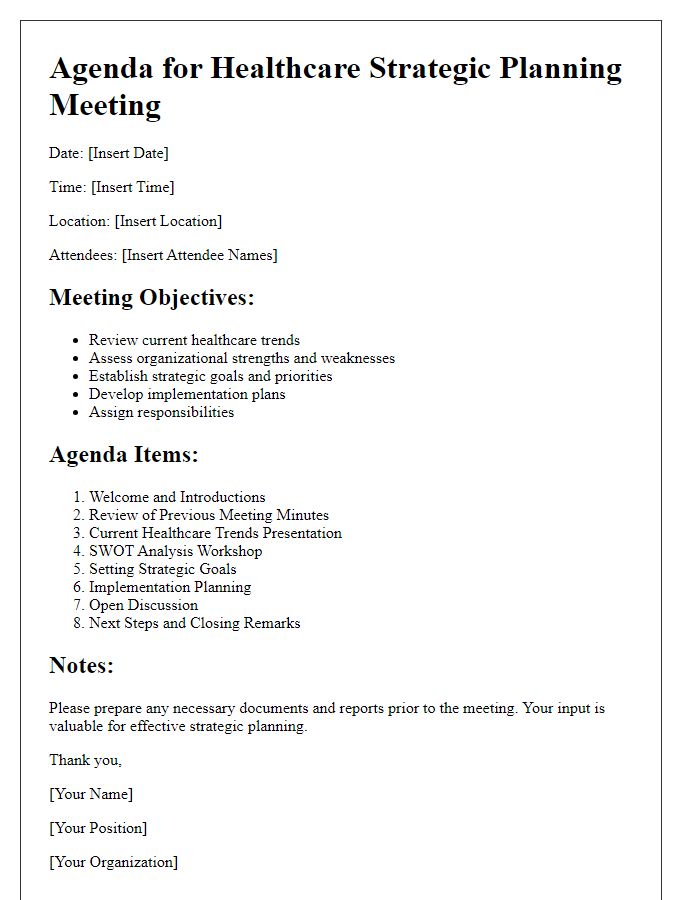
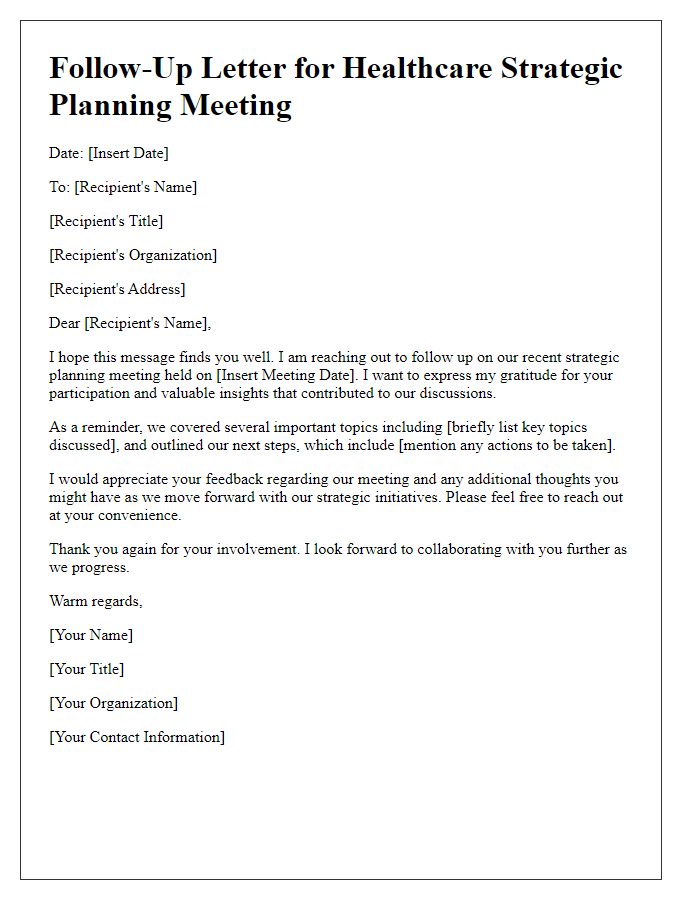

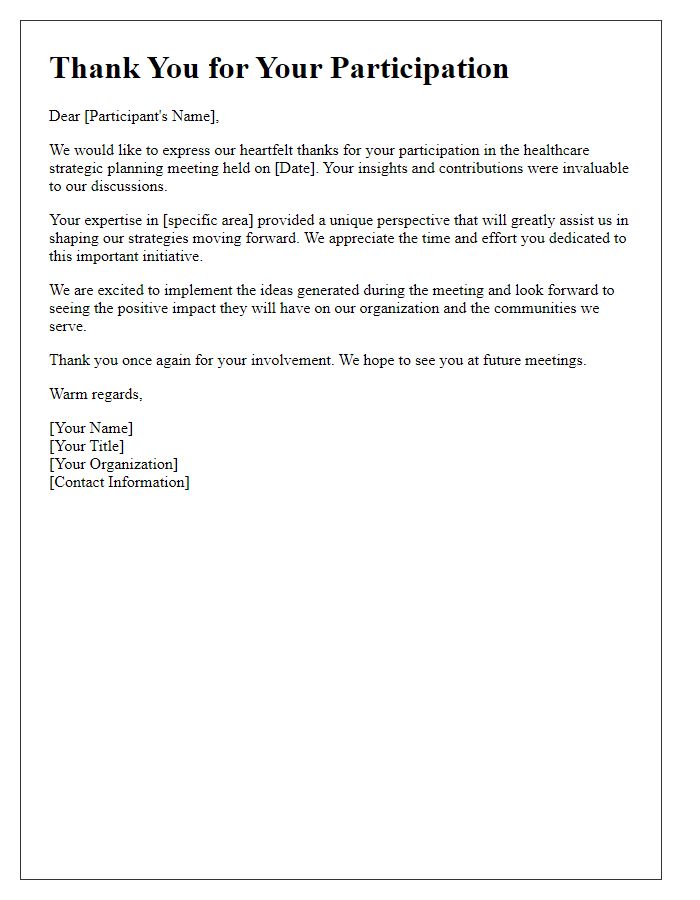


Comments